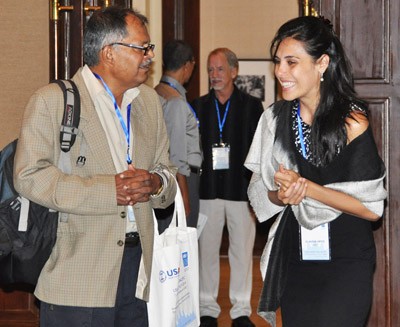
For Immediate Release
SIEM REAP, Cambodia - More than 100 government officials from 20 nations in Asia and the Pacific, including some of the region’s least developed countries, are meeting with donor institution representatives in Siem Reap this week to learn how to strengthen their public financial management systems to better access and handle financing for climate change adaptation projects.
Organized by the U.S. Agency for International Development (USAID) in partnership with the United Nations Development Programme (UNDP), the two-day USAID Adapt Asia-Pacific Third Annual Forum is a platform for participants to share experiences and identify solutions to climate financing challenges.
“Finding effective ways for at-risk communities to finance the cost of adaptation to the effects of climate change is key to reducing vulnerabilities and improving people’s lives and livelihoods,” said Michael Yates, Director of USAID’s Regional Development for Asia. "Countries in this region are often hardest hit by extreme weather, such as tropical cyclones and flooding, and need to improve their resilience by planning and acting before disaster strikes."
Recent studies estimate that 100 million people could be affected by storm surges in South Asia and that erratic weather patterns will likely result in a rise of vector- and water-borne diseases such as dengue and diarrhea, especially among women and children. The estimated costs of adapting to the effects of climate change range from $70 billion to $100 billion annually by the year 2050.
The Forum is sharing information to help Asia and Pacific Island governments better understand how to access funds such as those associated with the United Nations Framework Convention on Climate Change. Forum participants are also discussing ways to strengthen their own country systems and arrangements and procedures to independently and effectively access and manage sources of financing.
“Many Asia-Pacific country officials here today are in the process of integrating climate change risks into their strategic medium and long-term planning systems. This process will build institutional capacity and ready the countries to make the most of opportunities from the evolving architecture on climate finance including from climate funds managed by the Global Environment Facility and recently established Green Climate Fund,” said Gordon Johnson, Regional Cluster Leader, Resilient and Sustainable Development from UNDP. “Through such forums that foster dialogue and cooperation between countries, we hope to guide countries to effectively manage emerging climate change related risks and to support them with their own efforts to move towards a low-emission, climate-resilient future.”
Participants learned about actions that their peers around the region have taken to strengthen their country systems, including aligning national adaptation plan processes for climate sensitive budgets and plans, strengthening financial systems to access climate funds and harnessing private sector investment for adaptation.







Comment
Make a general inquiry or suggest an improvement.